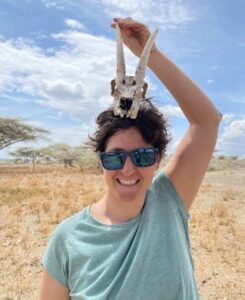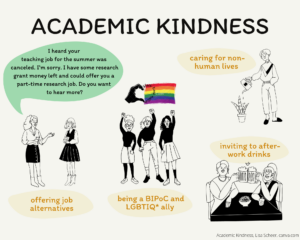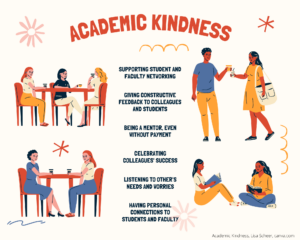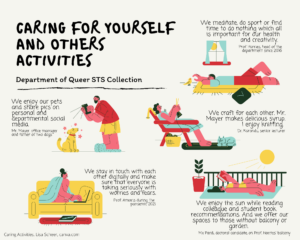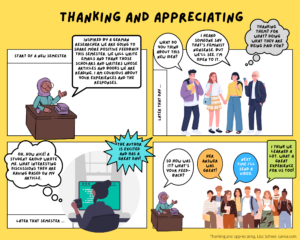Lisa Scheer
Comics on possibilities of academic kindness
When I received my colleagues’ call for contributions for this year’s Queer STS forum, I immediately knew (1) that I would submit something and (2) that this something would be comics. I find the possibility to contribute in other than the usual written forms very stimulating and positive. Although I feel very good and safe with written tasks and calls for papers, I not always feel like writing. And just recently I have started using comics to deepen student learning. Therefore, I saw the call as an opportunity for me to try out my comic skills and to check how it feels to process a topic in a visual way.
At first, my thoughts were rather critical. My sarcastic answer to the question “Who are the ones being able to act kind in academia?” was: Those who can afford it because they have safe jobs, because they do not have to worry about much in their lives. I saw academic kindness as some sort of queer-feminist daydream, an unrealistic wish that mainstream academia would dismiss with the blink of an eye. But when I researched academic kindness as inspiration for my comics, my perspective changed. I found so many suggestions that I took for decent human behaving, for being a good colleague or teacher, which led me to rethink my understanding of academic kindness. I now believe that everyone in academia can be kind without much effort as the range spans from appreciating one another to being a good mentor. Inspired by the website academickindness.tumblr.com hosted by Rabia Gregory (https://www.insidehighered.com/news/2014/01/09/blog-aims-normalize-kindness-academe) as well as Philipp Schulz’ activities (https://blogs.fu-berlin.de/toolbox/2020/03/05/academic-kindness) I created five comics on the website canva.com which are titled
- Academic Kindness 1
- Academic Kindness 2
- Being kind and caring
- Caring Activity Collection
- Thanking and appreciating
In different styles they visualise what academic kindness can be, e.g. sending thank-you emails to authors whose articles were read in class, providing spaces such as gardens or balcony’s to colleagues, crafting for each other, offering help or project hours, celebrating colleagues’ success, caring for others as in listening to their needs and worries, connecting to others, building relationships that are not solely based on work issues, giving constructive feedback, being an ally and being a good team leader which includes valuing the opinions and knowledge of others. Looking back now, maybe the forum call already was academic kindness – offering a wide range of formats to creatively discuss, illuminate and analyse a topic?

